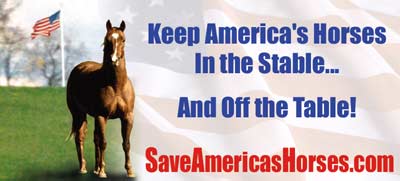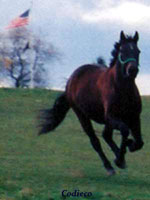
Horse Slaughter
FAQ's
Facts
Slaughter Stats
Public Opinion Polls
Press
What You Can Do!
About
Who We Are
Our Horses
Support/Donations
Merchandise
Contact Us:
Links
California Voters "Just Say Neigh" to Horse Slaughter!
HoofPAC
Equine Protection Network
Shop online at IGive.com with over 400 great stores you know & love- including Back In the Saddle! Up to 26% of the purchase price is donated to the EPN!
Join today!The EPN gets $5 extra the first time you shop!
PayPal accepts credit cards! Please send your tax deductible donation to the:Equine Protection Network, Inc.,
P. O. Box 232, Friedensburg, PA, 17933.
HoofPAC is the political action committee that has been formed to end the slaughter of America's horses. Cathleen Doyle, founder of HoofPAC, led the successful Save The Horses campaign in 1998 that made the slaughter of California's horses a felony.
Page last revised on:


Frequently Asked Questions on Horse Slaughter
The Collection Process for Slaughter
The racetrack connection to horse slaughter-
Often at racetracks there is a dealer that is known as the, "meat man". Everybody at the track knows what day the "meat man cometh", and where they can take their horses to be loaded onto the trailer for the trip to the local auction and receive payment for their horse.
In recent years there has been more of an effort to find alternatives to sending the racehorse that is too slow, or whose career has ended due to an injury to the auction. The EPN has long advocated trainers looking for the next hunter/jumper/or dressage prospect to go directly to the racetrack and bypass the auction.
 By bypassing the auction, the potential owner can talk to the trainer directly, and the horse is never exposed to the numerous horses at auctions, many of which are carrying disease. The potential for injury is greatly increased at these auctions where horses are often tied up side by side with strange horses, or once purchased by the "killers" are turned loose into large overcrowded pens, often filled with their own structural hazards.
By bypassing the auction, the potential owner can talk to the trainer directly, and the horse is never exposed to the numerous horses at auctions, many of which are carrying disease. The potential for injury is greatly increased at these auctions where horses are often tied up side by side with strange horses, or once purchased by the "killers" are turned loose into large overcrowded pens, often filled with their own structural hazards.
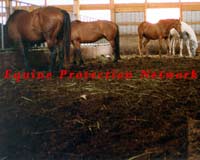 For the horses there is the added benefit of not being forced to travel from the track to the low end auction, sold, and then possibly trucked to another auction in the filthy dealer trailers and then stand in the manure filled
For the horses there is the added benefit of not being forced to travel from the track to the low end auction, sold, and then possibly trucked to another auction in the filthy dealer trailers and then stand in the manure filled 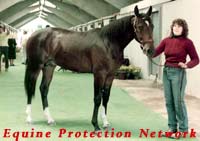 drop off pens at another auctions ) until the killer buyer completes his load for the slaughterhouse. Nor are these horses subjected to the rough and sometimes vicious handling by uncaring auction workers and dealers.
drop off pens at another auctions ) until the killer buyer completes his load for the slaughterhouse. Nor are these horses subjected to the rough and sometimes vicious handling by uncaring auction workers and dealers.
These auctions are a far cry from the sale rings of Lexington, Keenland and Saratoga with their carpeted aisles, tan barked rings and white gloved handlers.
What auctions have "Killer Buyers"?
All horse auctions have dealers who travel from sale to sale buying and selling horses with the ultimate goal of making money. The dealer sells the horse to the purchaser who pays the most within a time frame that allows the dealer to make a profit on the horse.
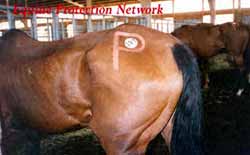 The horses in this photo bear a red "P" around the USDA backtag on their hip. That mark identifies these horses as belonging to a certain "killer buyer" and allows the slaughterhouse to credit his account for the horses.
The horses in this photo bear a red "P" around the USDA backtag on their hip. That mark identifies these horses as belonging to a certain "killer buyer" and allows the slaughterhouse to credit his account for the horses.
Slaughter provides horse dealers with a guaranteed method of clearing their inventory on a weekly basis with a guaranteed base price.
"Killer buyers" also have dealers who will purchase horses at various auctions, racetracks or directly from owners and then deliver the horses to an auction where the horses are dropped off for the "killer buyer" to then deliver to the slaughterhouse.
Smaller horse auctions are comparable to the large end of a funnel. Auctions known in the horse community as "meat sales" or "killer sales" are the small end of the funnel. Agawam, MA, Cottonwood, NM, Middleburg, PA New Holland, PA Shepherdsville, KY Shipshewanna, IN Sugarcreek, OH, and Unadilla, NY are a few examples of horse auctions that have reputations as "meat auctions".
 This blind appaloosa mare was dropped off by her owner and sold directly to a killer buyer for a Texas slaughterhouse. The owner stated that he believed the killer buyer would "take good care of her."
This blind appaloosa mare was dropped off by her owner and sold directly to a killer buyer for a Texas slaughterhouse. The owner stated that he believed the killer buyer would "take good care of her."
The mare proceeded to bump into the sides of the drop off pen over course of the next several hours until she was loaded onto the trailer destined for yet another holding facility to be held until the killer buyer had accumulated enough horses for a trip to the slaughterhouse.
She had no water, no hay. She would be herded into the trailer, not led. Not once, but at least 2 more times. Her final ride would be over 28 hours to Texas with no food, no water, and no rest. At the slaughterhouse she would be herded with other horses into the line up where she could smell and hear the horses ahead of her being killed. She would hear them struggle and thrash in the knockbox. She would smell the blood. One can only imagine the terror she experienced, all because her owner chose to get the last few dollars out of her, her meat price.
Drop Off Pen Injuries
Research studies conducted on the transportation of horses to slaughter concluded that horses shipped directly to slaughter suffered less external injuries and less carcass bruises than the horses that were transported to several auctions while the "killer buyer" collected a full load. Dealers stated to researchers that they have to attend several auctions to collect a full load, and that the horses have to be loaded and unloaded several times for food and water.
The EPN does not accept the statement that all of these dealers unload these horses for food and water at all the auctions. Numerous times we have documented "drop off" horses with no food and no water. The vast majority of time these horses are standing in manure, whether it is on the trailer or off the trailer. Horses with severe injuries that would attract attention are left hidden from public view on trailers.
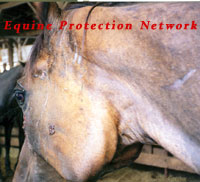 This horse has a piece of flesh from his facial wound on his cheek. There are other injuries on his body also, most likely caused by fighting at another auction, on the trailer, or in this drop off pen. From a USDA research study conducted in 1998 by Temple Grandin:"The number one problem that needs to be corrected in transport and marketing is injuries caused by horse fights. At the New Holland sale three horses were injured in a fight that occurred in a "dealer drop off pen". One horse received a severe eye injury"
This horse has a piece of flesh from his facial wound on his cheek. There are other injuries on his body also, most likely caused by fighting at another auction, on the trailer, or in this drop off pen. From a USDA research study conducted in 1998 by Temple Grandin:"The number one problem that needs to be corrected in transport and marketing is injuries caused by horse fights. At the New Holland sale three horses were injured in a fight that occurred in a "dealer drop off pen". One horse received a severe eye injury"
 Horse owners complained about the conditions in drop off pens at horse auctions for years. The fights between aggressive horses or stallions. Stallions breeding mares. No food available. No water available, even though there was access to water troughs and running water. Injuries that the horses sustained, left untreated. Auction workers and owners referred to experienced horse people as, "animal rights activists."
Horse owners complained about the conditions in drop off pens at horse auctions for years. The fights between aggressive horses or stallions. Stallions breeding mares. No food available. No water available, even though there was access to water troughs and running water. Injuries that the horses sustained, left untreated. Auction workers and owners referred to experienced horse people as, "animal rights activists."  Yet when a USDA researcher comes to the same conclusions as the horse people, it is heralded as scientific. Is that because our tax dollars paid for it? This is not rocket science; anybody who has experience with horses and some common sense can figure this out. The reason for the handling of the horses destined for slaughter in the drop off pens can be traced to one reason. Money. The meat men have so often said, "Why feed a dead horse?"
Yet when a USDA researcher comes to the same conclusions as the horse people, it is heralded as scientific. Is that because our tax dollars paid for it? This is not rocket science; anybody who has experience with horses and some common sense can figure this out. The reason for the handling of the horses destined for slaughter in the drop off pens can be traced to one reason. Money. The meat men have so often said, "Why feed a dead horse?"
Drop Off Pen - Food and Water?
During research for the Commercial Transportation of Horses to Slaughter Act regulations, dealers stated to researchers that they have to attend several auctions to collect a full load, and that the horses have to be loaded and unloaded several times for food and water.
 The pony searches for water in the empty trough. There is no hay in the rack or on the ground. Conditions in the drop off pens and the kill pens at New Holland Sales Stables improved after the
The pony searches for water in the empty trough. There is no hay in the rack or on the ground. Conditions in the drop off pens and the kill pens at New Holland Sales Stables improved after the  PA State Police, PSP, responded to complaints regarding the conditions at the auction in July 1998, only a week before USDA researcher Temple Grandin attended the sale. The enforcement action by the PSP resulted in changes that improved the conditions for the horses.
PA State Police, PSP, responded to complaints regarding the conditions at the auction in July 1998, only a week before USDA researcher Temple Grandin attended the sale. The enforcement action by the PSP resulted in changes that improved the conditions for the horses.
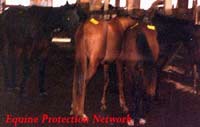 These horses, including weanlings are in the drop off pens at horse auction. Horses of all sizes and ages are turned loose together in drop pens, kill pens and trailers during the collection process for slaughter.
These horses, including weanlings are in the drop off pens at horse auction. Horses of all sizes and ages are turned loose together in drop pens, kill pens and trailers during the collection process for slaughter.
Drop Off Pens - Injuries, Filth, and Overcrowding
The collection process for slaughter can span weeks as dealers travel from auction to auction, racetrack to racetrack, or responds to ads in the local paper. Some dealers even place ads in local papers or horse publications offering a good home to companion horses or a retirement home for your unwanted horse. Dealers have used these scams on horse owners for as long as there has been a profit to be made by selling a horse to slaughter. These scams will continue until slaughter is illegal and dealers can no longer profit from companion horses.
This horse destined for slaughter in a Canadian slaughterhouse is in a drop off pen at a horse auction. These horses were collected at various sales and then transported across state lines without health certificates or Coggins Test because they are slaughter horses. These horses are held only yards away from other horses in the sale barn.
Buying Horses Out of the Killer Pens
Often dealers are approached by people interested in purchasing horses in the drop off pens. Dealers will generally sell the horses for $50 to $100 more than what they paid for the horse. Dealers do this for one reason-they are in the horse-trading business to make money! If a dealer can make more money selling a horse to a slaughterhouse, than they can make selling it to another buyer, than they will send the horse to slaughter.
As horse rescue organizations began purchasing more horses at auctions and adopting them into new homes dealers complained that these "rescue horses" were hurting their business. Now, dealers have realized that they can sell horses to the rescue/welfare organizations for more money than if they sold the horses to slaughter. At the same time it is a public relations coup for the dealers who state that they contact the rescue groups whenever they have a neglected, sick, or injured horse. Dealers are not doing this out of the kindness of their hearts; they are doing it because they can make a bigger profit, and look better in the eyes of the public than if they sent the horse to slaughter!
 The horse is then saved from slaughter, the rescues are able to proclaim that they have saved a horse, and the horse is rehabilitated and adopted into a new home. Everybody wins, including the owner who neglected, starved and crippled the horse because none of the players take action to prosecute the people who committed the cruelty to the horse!
The horse is then saved from slaughter, the rescues are able to proclaim that they have saved a horse, and the horse is rehabilitated and adopted into a new home. Everybody wins, including the owner who neglected, starved and crippled the horse because none of the players take action to prosecute the people who committed the cruelty to the horse!
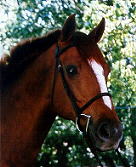 The number of horses purchased from the "killer pens" that have gone on to glory in the show ring could fill a book. The number of horses who have won over 6 figures on the racetrack, and that have later been pulled from the "killer pens" could be a sequel to the first book! Almost anybody who has owned horses has at one time or another purchased a horse that was neglected or destined for slaughter.
The number of horses purchased from the "killer pens" that have gone on to glory in the show ring could fill a book. The number of horses who have won over 6 figures on the racetrack, and that have later been pulled from the "killer pens" could be a sequel to the first book! Almost anybody who has owned horses has at one time or another purchased a horse that was neglected or destined for slaughter.
Purchasing the horses has made a difference to that horse, but it has done nothing to hold owners responsible for over breeding, the irresponsible use of their horse that results in a permanent unsoundness, neglect, or poor training. Owners need to made accountable for their actions, not provided with a dumping ground for their "mistakes" and "problems".
Until horse owners are at the end of the shank when that horse hits the ground for the last time, owners and breeders are not going to change the practices that cause so many horses to become unwanted and unusable at such an early age. The horse industry has to turn off the faucet, the horse welfare organizations can't catch all the horses, nor should they. Non - profit organizations funded by public donations should not have to fund the retirement or rehabilitation for the horses cast off by their owners. The former owner moves on to spend thousands of dollars on the purchase, maintenance and enjoyment of a new horse and rarely is donation made to the horse welfare organization that is funding the retirement of the former owner's "beloved " horse. It is called personal responsibility.
Does the EPN believe that all horses destined for slaughter need to be "saved"?
No. Many horses purchased by "killer buyers" need to be euthanised. The EPN is not opposed to the horse's life ending, we are opposed to:
- the method used to end the horse's life, (slaughter);
- the prolonged suffering of the horse, (transport to a sale, sold, transported to holding facility, and finally transport hundreds or thousands of miles to a slaughterhouse;
- Owners, dealers, auction houses, shippers, and slaughterhouses all profiting from a horse that is suffering due to sickness or injury. The EPN does not believe that irresponsible owners should profit from their irresponsible and sometimes criminal actions.
Save America's Horses! |
|||||||
|
Please send your tax deductible donation to: Equine Protection Network, Inc., P. O. Box 232, Friedensburg, PA, 17933 |
||
Save America's Horses- Make the Commitment to Your Horse! |
||
|
Photos On This Page CANNOT be Used Without Written Permission
|
||

